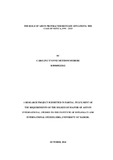| dc.description.abstract | The international regime’s focus on durable solutions for refugees – Repatriation,
Integration and resettlement as the only viable options for refugees only serve to
perpetuate the protracted situations as time has proven that they are ineffective. This
lack of foreseeable alternatives has dire consequences on the entire refugee
population. In Kenya for example, aid organizations and the government seem to be
stuck at the emergency phase characterised by saving lives, protection and provision
of basic needs and have not yet moved on to finding durable solutions. The genuine
intention of aid agencies has also been put to question. This study sought to establish
whether aid has contributed in one way or another to this protracted situation and
investigate to what extent it has contributed to creating a situation of perpetual
dependency within the refugee population. This study used secondary data in
analysing the variables. Secondary data include data gathered from documents search
such as media reports, analysis and review of published books, journals, papers,
periodicals, and unpublished works as well as government's official documents. The
study used secondary data in the form of documented information from libraries and
other relevant institutions. The findings from these secondary data were analysed
through content analysis. The key emerging issues in this study were that resettlement
was effectively the only durable solutions for refugees in protracted situations in
Kenya, however, moving forward and in recognition that only a small percentage of
refugees can be resettled to third countries, wherever possible, policy actors should
seek to work in harmony with, rather than against, refugees’ efforts to become more
productive and empowered members of society. Two areas have emerged for further
studies in respect to refugees in protracted situations namely; (i) the contribution of
resettled refugees in curtailing dependence on aid and (ii) the significance of selfreliance
strategies in combating protracted refugee situations. | en_US |

